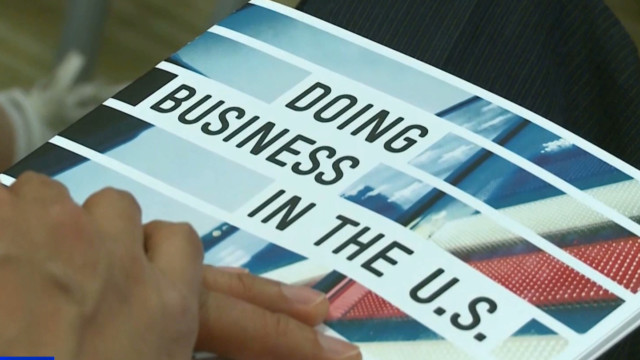U.S. and Chinese negotiators are trying to ease trade tensions between the world’s two largest economies. But disputes haven’t stopped local governments in the U.S. from courting Chinese business. CGTN’s Mark Niu has more.
Compared to the high-speed trains in cities like Beijing and Shanghai, California’s rail technology lags behind.
That’s partly why Michael Lee of China’s largest train technology supplier, CRSC, is in San Francisco looking for opportunities.
“The current U.S.-China tensions definitely are having an impact on the people, on our potential customers, how they think about doing business with China,” said Lee, President of CRSC Research & Design Institute, Inc.
“However, I feel confident we do bring a lot of advantages.”
Lee was at the Bridge from China event and listening to experts like Wenli Wang, whose accounting firm, Moss Adams, helps Chinese clients invest in the U.S.
She says in the current climate, the Committee on Foreign investment in the U.S., known as CFIUS, has become a bigger factor.
“A client of mine, they announced the deal last October and they are going through the process. It’s taken much longer,” she said.
“Before mid-year 2017, you know people talk about CFIUS, but really the deals get denied are very minimal. And now it’s become a regular concern.”
David Kaufman, director of global strategies at Nixon Peabody, starting doing business in China more than 30 years ago. He says even in these turbulent times, there’s still plenty of opportunity.
“Most of business is done locally. The federal government hasn’t played a huge role in encouraging investment internationally anyways,” Kaufman said.
“Local government and local business and local institutions have to roll up their sleeves and get it done. And you have to create an environment where folks coming from overseas feel comfortable investing.”
Kaufman helped found one of the groups supporting this event, ChinaSF, an initiative formed under San Francisco’s Center of Economic Development.
Over the past ten years, ChinaSF has recruited at least 96 Chinese companies, created nearly 800 jobs and attracted more than $5.1 billion in foreign direct investment from China.
Other U.S. cities are studying ChinaSF’s model, whose success has also spawned both LatinSF and AsiaSF.
In a few months, all of those groups will soon fall under GlobalSF, a non-profit organization that gets a grant from the city of San Francisco.
“I think we are unique, the fact that we have such a close relationship with the city,” said Darlene Chiu Bryant, Executive Director of ChinaSF.
“Because we are outside the city we can explain things, talk about things in ways that organizations and particularly businesses will understand. Whereas many times as a city official it’s really hard to explain things that a business, especially a foreign business, can understand.”
Chiu Bryant says the current trade tensions have had little impact on her work, except in one area.
“I think there is never a lack of investors,” Chiu Bryant said. “However, what I have been seeing is that the State Department has started to reject visa applications from China, so I’ve gotten quite a few calls about that. And unfortunately, that’s something I can’t help with.”
 CGTN America
CGTN America

